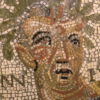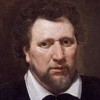IMMORALITY. The morality of those who are having a better time.
H. L. Mencken (1880-1956) American writer and journalist [Henry Lewis Mencken]
The Book of Burlesques, “The Jazz Webster” (1920)
(Source)
Variant:
Immorality is the morality of those who are having a better time.
[Chrestomathy, ch. 30 "Sententiae" (1949)]
Quotations about:
accusation
Note not all quotations have been tagged, so Search may find additional quotes on this topic.
HERMIONE: Since what I am to say must be but that
Which contradicts my accusation, and
The testimony on my part no other
But what comes from myself, it shall scarce boot me
To say “Not guilty.” Mine integrity,
Being counted falsehood, shall, as I express it,
Be so received. But thus: if powers divine
Behold our human actions, as they do,
I doubt not then but innocence shall make
False accusation blush and tyranny
Tremble at patience.William Shakespeare (1564-1616) English dramatist and poet
Winter’s Tale, Act 3, sc. 2, l. 23ff (3.2.23-33) (1611)
(Source)
Cynical is the name we give those we fear may be laughing at us.
Stephen Fry (b. 1957) British actor, writer, comedian
The Hippopotamus, ch. 4, sec. 3 [Ted] (2014)
(Source)
ACCUSE, v.t. To affirm another’s guilt or unworth; most commonly as a justification of ourselves for having wronged him.
Ambrose Bierce (1842-1914?) American writer and journalist
“Accuse,” The Cynic’s Word Book (1906)
(Source)
Included in The Devil's Dictionary (1911).
Originally published in the "Cynic's Word Book" column, New York American (1904-07-09) and the "Cynic's Dictionary" column, San Francisco Examiner (1904-07-17).
You injure yourself by your own vindictiveness, and give your enemies too great an advantage, if you accuse them of things that are not true, and tell lies in order to disparage them.
[C’est se venger contre soi-même, et donner un trop grand avantage à ses ennemis, que de leur imputer de choses qui ne sont pas vraies, et de mentir pour les décrier.]
Jean de La Bruyère (1645-1696) French essayist, moralist
The Characters [Les Caractères], ch. 11 “Of Mankind [De l’Homme],” § 150 (11.150) (1688) [tr. Stewart (1970)]
(Source)
(Source (French)). Alternate translations:
We are reveng'd on our selves, and give our Enemies too much advantage over us, when we say things of them which are not true, and lie to reproach 'em.
[Bullord ed. (1696)]
'Tis reproaching our selves, and giving our Enemies too much advantage over us, to say things of them which are not true, and lie to disparage them.
[Curll ed. (1713)]
We are vindictive to our own loss, and give the Staff into our Enemies Hands, when we say things of them which are not true, and lie to defame them.
[Browne ed. (1752)]
To say things of our enemies which are not true, and to lie to defame them, is to avenge ourselves on ourselves, and give them too great an advantage over us.
[tr. Van Laun (1885)]
Clever Odysseus scowled back and sneered,
“Dogs! So you thought I would not come back home
from Troy? And so you fleeced my house, and raped
my slave girls, and you flirted with my wife
while I am still alive! You did not fear
the gods who live in heaven, and you thought
no man would ever come to take revenge.
Now you are trapped inside the snares of death.”[τοὺς δ᾽ ἄρ᾽ ὑπόδρα ἰδὼν προσέφη πολύμητις Ὀδυσσεύς:
‘ ὦ κύνες, οὔ μ᾽ ἔτ᾽ ἐφάσκεθ᾽ ὑπότροπον οἴκαδ᾽ ἱκέσθαι
δήμου ἄπο Τρώων, ὅτι μοι κατεκείρετε οἶκον,
δμῳῇσιν δὲ γυναιξὶ παρευνάζεσθε βιαίως,
αὐτοῦ τε ζώοντος ὑπεμνάασθε γυναῖκα,
οὔτε θεοὺς δείσαντες, οἳ οὐρανὸν εὐρὺν ἔχουσιν,
οὔτε τιν᾽ ἀνθρώπων νέμεσιν κατόπισθεν ἔσεσθαι:
νῦν ὑμῖν καὶ πᾶσιν ὀλέθρου πείρατ᾽ ἐφῆπται. ’]Homer (fl. 7th-8th C. BC) Greek author
The Odyssey [Ὀδύσσεια], Book 22, l. 34ff (22.34) (c. 700 BC) [tr. Wilson (2017)]
(Source)
Discussion here of πεῖραρ and the metaphor of bonds/snares in this passage (and this preceding one).
(Source (Greek)). Alternate translations:
He, frowning, said: “Dogs, see in me the man
Ye all held dead at Troy. My house it is
That thus ye spoil, and thus your luxuries
File with my women’s rapes; in which ye woo
The wife of one that lives, and no thought show
Of man’s fit fear, or God’s, your present fame,
Or any fair sense of your future name;
And, therefore, present and eternal death
Shall end your base life.”
[tr. Chapman (1616)]
Then said Ulysses, with a sullen eye,
Dogs, dead you thought me, and spent my estate;
With you my woman you compell’d to lie;
And would have wedded, whilst I liv’d, my mate.
No fear you had neither of Gods on high,
Nor of revenge from any mortal man;
But now a vengeance to you all is nigh.
[tr. Hobbes (1675), l. 29ff]
Then, grimly frowning, with a dreadful look,
That wither'd all their hearts, Ulysses spoke:
"Dogs, ye have had your day! ye fear'd no more
Ulysses vengeful from the Trojan shore;
While, to your lust and spoil a guardless prey,
Our house, our wealth, our helpless handmaids lay:
Not so content, with bolder frenzy fired,
E'en to our bed presumptuous you aspired:
Laws or divine or human fail'd to move,
Or shame of men, or dread of gods above;
Heedless alike of infamy or praise,
Or Fame's eternal voice in future days;
The hour of vengeance, wretches, now is come;
Impending fate is yours, and instant doom."
[tr. Pope (1725)]
Then thus Ulysses, louring dark, replied.
O dogs! not fearing aught my safe return
From Ilium, ye have shorn my substance close,
Lain with my women forcibly, and sought,
While yet I lived, to make my consort yours,
Heedless of the inhabitants of heav’n
Alike, and of the just revenge of man.
But death is on the wing; death for you all.
[tr. Cowper (1792), l. 36ff]
Whom the king sternly eyed, and to the godless crew:
"Dogs, ye denied that I should e'er come back
From Troia's people to my native land.
Long in your pride my house ye rend and wrack,
Yea, and ye force the women with violent hand,
And my wife claim while I on earth yet stand,
Nor fear the gods who rule in the wide sky,
Nor lest a mortal on the earth demand
Your price of guilt -- and ye are like to die!
Round you Death's fatal toils inextricably lie."
[tr. Worsley (1861), st. 5-6]
Then with a scowl addressed many-witted Odysseus:
"Ye dogs! ye thought that I should ne'er return
From Troy-land home: and so my house ye harried;
And forced my maids to be your paramours;
And wooed my wife, while I myself was living! --
Ye feared not the gods, who old broad heaven;
Nor reckoned on coming vengeance from mankind!
Now you -- e'en all -- the goal of death is touching!
[tr. Bigge-Wither (1869)]
But, with a grim regard, Ulysses thus
Indignant cried: -- "Ye hounds! Your thought it was
That never more should I, to home restor'd
From Troy return: And therefore all my means
Of Life's subsistence have ye here laid waste --
The handmaids of my household with rude force
Your wont hath been to outrage, and, while I
Myself a living man on earth surviv'd
Ye have as suitors my espoused wife
In marriage sought; the anger of the gods
That rule on high despising, -- and the thought
Of that revenge which, at some future day,
Should overtake you from the hands of men.
A ruin that shall overwhelm you all,
Is now at hand: 'tis here!"
[tr. Musgrave (1869), l. 57ff]
Then Odysseus of many counsels looked fiercely on them, and spake: “Ye dogs, ye said in your hearts that I should never more come home from the land of the Trojans, in that ye wasted my house, and lay with the maidservants by force, and traitorously wooed my wife while I was yet alive, and ye had no fear of the gods, that hold the wide heaven, nor of the indignation of men hereafter. But now the bands of death have been made fast upon you one and all.”
[tr. Butcher/Lang (1879)]
Unto whom spake the wise Odysseus, scowling from knitted brow:
"O Dogs! And ye were saying that I should come home no more
From the people of the Trojans! So ye wasted my house and my store,
And lay with my women servants perforce and against my will.
And wert wooing my wife from off me when I was living still;
And niether the gods were ye fearing that hold the heavens the wide,
Nor yet the vengeance of menfolk that hereafter should betide.
But now the end of the Death-doom is on you one and all."
[tr. Morris (1887)]
But looking sternly on them wise Odysseus said: "Dogs! You have been saying all the time I never should return out of the land of Troy; and therefore you have destroyed my home, outraged my women-servants, and, -- I alive, -- covertly wooed my wife, fearing no gods that hold the open sky, nor that the indignation of mankind would fall on you hereafter. Now for you one and all destruction's cords are knotted!"
[tr. Palmer (1891)]
But Ulysses glared at them and said: -- "Dogs, did you think that I should not come back from Troy? You have wasted my substance, have forced my women servants to lie with you, and have wooed my wife while I was still living. You have feared neither God nor man, and now you shall die."
[tr. Butler (1898)]
But Odysseus glared at them and said: "Dogs, did you think that I should not come back from the dêmos of the Trojans? You have wasted my substance, have forced my women servants to lie with you, and have wooed my wife while I was still living. You have feared neither the gods nor that there would be future nemesis from men, and now you shall die."
[tr. Butler (1898), rev. Power/Nagy]
But resourceful Odysseus glared at them and said: “Dogs, did you think that I should not come back from the district [dēmos] of the Trojans? You have wasted my substance, have forced my women servants to lie with you, and have wooed my wife while I was still living. You have feared neither the gods nor that there would be future nemesis from men, and now you shall die.”
[tr. Butler (1898), rev. Kim/McCray/Nagy/Power (2018)]
Then with an angry glance from beneath his brows Odysseus of many wiles answered them: “Ye dogs, ye thought that I should never more come home from the land of the Trojans, seeing that ye wasted my house, and lay with the maidservants by force, and while yet I lived covertly wooed my wife, having no fear of the gods, who hold broad heaven, nor of the indignation of men, that is to be hereafter. Now over you one and all have the cords of destruction been made fast.”
[tr. Murray (1919)]
But Odysseus glaring at them cried, "Dogs that you are, you kept harping on your conviction that I would never return from the Troad, and in that strong belief let yourselves ravage my house, ravish my housemaidens and woo my wife, while I was yet alive. You have flouted the Gods of high heaven and the consequent wrath of men: so now you are all trapped in death's toils."
[tr. Lawrence (1932)]
The unconquerable Odysseus looked down on them with a scowl. "You curs!" he cried. "You never thought to see me back from Troy. So you ate me out of house and home; you raped my maids; you wooed my wife on the sly though I was alive -- with no more fear of the gods in heaven than of the human vengeance that might come. I tell you, one and all, your doom is sealed!"
[tr. Rieu (1946)]
But glaring under his brows Odysseus answered:
"You yellow dogs, you thought I'd never make it
home from the land of Troy. You took my house to plunder,
twisted my maids to serve your beds. You dared
bid for my wife while I was still alive.
Contempt was all you had for the gods who rule wide heaven,
contempt for what men say of you hereafter.
Your last hour has come. You die in blood.”
[tr. Fitzgerald (1961)]
But looking darkly upon them resourceful Odysseus answered:
"You dogs, you never thought that I would any more come back
from the land of Troy, and because of that you despoiled my household,
and forcibly took my serving women to sleep beside you,
and sought to win my wife while I was still alive, fearing
neither the immortal gods who hold the wide heaven,
nor any resentment sprung from men to be yours in the future.
Now upon all of you the terms of destruction are fastened."
[tr. Lattimore (1965)]
Odysseus of many wiles glared at them and spoke:
"Dogs, you thought I would no longer come home in return
From the land of the Trojans, in that you wore my house away
And slept alongside my serving women by force
And underhandedly courted my wife while I was myself alive,
And you did not fear the gods who possess broad heaven,
Or that there would be any vengeance of men in time to come.
Now the bonds of destruction are fastened on you all."
[tr. Cook (1967)]
Odysseus scowled:
"You thought I would never return from Troy;
and so -- you dogs -- you sacked my house, you forced
my women servants to your will and wooed
my wife in secret while I was still alive.
You had no fear of the undying gods,
whose home is spacious heaven, and no fear
of men's revenge, your fate in days to come.
Now all of you are trapped in death's tight thongs."
[tr. Mandelbaum (1990)]
With a dark look, the wily fighter Odysseus shouted back,
"You dogs! you never imagined I'd return from Troy --
so cocksure that you bled my house to death,
ravished my serving-women -- wooed my wife
behind my back while 1 was still alive!
No fear of the gods who rule the skies up there,
no fear that men's revenge might arrive someday --
now all your necks are in the noose -- your doom is sealed!"
[tr. Fagles (1996)]
Odysseus
Scowled at the whole lot of them, and said:
"You dogs! You thought I would never
Come home from Troy. So you wasted my house,
Forced the women to sleep with you,
And while I was still alive you courted my wife
Without any fear of the gods in high heaven
Or of any retribution from the world of men.
Now the net has been drawn tight around you."
[tr. Lombardo (2000)]
Looking from lowering brows said Odysseus of many devices:
"Oh you dogs, you believed I would have no return and would not come
home from the land of the Trojans, and so you have pillaged my household;
so you have taken to bed by force those women, the handmaids;
so though I was alive my wife you illicitly courted;
neither the gods you feared, the immortals who hold the broad heaven,
nor any vengeance that men might bring upon you in the future.
Now on all of you suitors the grim death bindings are fastened!"
[tr. Merrill (2002)]
The master-strategist Odysseus gave them a black look. "You dogs!" he cried. "You never thought to see me back from Troy. So you fleeced my household; you raped my maids; you courted my wife behind my back though I was alive -- with no more fear of the gods in heaven than of the human vengeance that might come. One and all, your fate is sealed."
[tr. DCH Rieu (2002)]
Looking at them darkly Odysseus of many wiles spoke: "You dogs! You never expected me to return home, back from the land of the Trojans; and so you plundered my house, you brutally forced my women servants to sleep with you, and you courted my wife in stealth while I was still alive, with no fear of the gods who inhabit the broad high sky, nor that the vengeful anger of men would one day follow. Now on every one of you death's ropes are fastened tight."
[tr. Verity (2016)]
Then, with an angry glance, resourceful Odysseus replied:
"You dogs, you thought that I'd never come home again
from the Trojans' land, the way you ravaged my house,
and forcibly bedded my women servants, and while
I was still alive, underhandedly courted my wife,
with no fear of the gods who own broad heaven,
or of any human reproof that might come hereafter!
Now over you all the bonds of destruction are set!"
[tr. Green (2018)]
Odysseus cried out: You thought I'd never return! You devoured my goods, seduced my maidservants, and came courting my wife while I was still alive! Now your fate's certain!
[tr. Green (2018), summary]
Shrewd Odysseus scowled at them
and gave his answer: “You dogs, because you thought
I’d not come back from Troy to my own home,
you’ve been ravaging my house, raping women,
and, in devious ways, wooing my wife,
while I was still alive, with no fear of gods
who hold wide heaven, or of any man
who might take his revenge in days to come.
And now a fatal snare has caught you all.”
[tr. Johnston (2019), l. 41ff]
The best way to know our faults is to notice which ones you accuse others of.
James Richardson (b. 1950) American poet
Vectors: Aphorisms and Ten-Second Essays, #195 (2001)
(Source)
When a man points a finger at someone else, he should remember that four of his fingers are pointing to himself.
Lesbian: Any uppity woman, regardless of sexual preference. If they don’t call you a lesbian, you’re probably not accomplishing anything.
Marie Shear (1940-2017) American writer and feminist activist
“Media Watch: Celebrating Women’s Words,” New Directions for Women (May/Jun 1986)
(Source)
You have to believe, by god, that he will be no better in the future after getting this judgment from you and will never stop taking bribes against you if you acquit him.
[οὐ γὰρ δὴ μὰ τὸν Ἡρακλέα βελτίω γενήσεσθαι αὐτὸν προσδοκᾶτε συγγνώμης νυνὶ τυγχάνοντα παρ᾿ ὑμῶν, οὐδὲ τὸ λοιπὸν ἀφέξεσθαι τοῦ λαμβάνειν χρήματα καθ᾿ ὑμῶν, ἐὰν νῦν ἀφῆτε αὐτόν.]
Dinarchus (c. 361-291 BC) Greek orator and speech writer [Dinarch, Deinarchus, Δείναρχος]
“Against Aristogiton”
(Source)
Alt. trans.:
- "Hope not to reform him; for if you pardon him now what assurance have you that he will not against betray your interests in the future?" [tr. Garland (1902)]
- "For you must assume, by Heracles, that there will be no improvement in him if he is pardoned by you now, and that in future he will not abstain from taking bribes against you if you now acquit him." [tr. Burtt (1962)]
Your minds that once did stand erect and strong,
What madness swerves them from their wonted course?
[Quo vobis mentes, rectae quae stare solebant
antehac, dementis sese flexere viai?]Ennius (239-169 BC) Roman poet, writer [Quintus Ennius]
Annals, Book 6, frag. 11 [tr. Falconer (1923)]
(Source)
Setting the words of Appius Claudius to verse, when Appius in his old age berated the Senate for considering peace and alliance with King Pyrrhus of Epirus, who had defeated them (in a "Pyrhhic victory") at Heraclea (280 BC). Fragment recorded in Cicero, De Senectute, ch. 6 / sec. 16 (4.16) (44 BC).
(Source (Latin)). Alternate translations:
Why seid Appius haue ye inclyned and revaled youre couragious hertys whiche til nowe were accustumyd to be ferme and stidfast. Be ye madd or for lak of discressyon agree ye for to condescend and desyre ye to make alliance and peas with kyng Pirrus bycause that he putteth in strength for to putt you downe and in subjection and wolde destroye yowe?
[tr. Worcester/Worcester/Scrope (1481)]
Why do your wits
And senses so rave?
What foolish conceit
Doth encumber your brain?
Where be the ripe judgments,
Which wont you were to have,
To agree to your country's
Ruin most plain?
[tr. Newton (1569)]
Whether now bend your minds, a headlong fall to bring,
Which heretofore had wont to stand, as straight as any thing.
[tr. Austin (1648)]
Whither now do you bend your Thoughts
Which, heretofore, were firm and resolute,
What! madly on your Ruin. ? --
[tr. J. D. (1744)]
What Frenzy now has your wild Minds possest?
You, who were first with sagest Counsels blest,
Your selves on sure Destruction thus to throw!
[tr. Logan (1744)]
Shall folly now that honoured Council sway,
Where sacred wisdom wont to point the way!
[tr. Melmoth (1773)]
Ah! wither have your minds demented turned themselves, wich heretofore were wont to stand erect?
[Cornish Bros. ed. (1847)]
Whither have your minds, which used to stand upright before, in folly turned away?
[tr. Edmonds (1874)]
Wont to stand firm, upon what devious way
Demented rush ye now?
[tr. Peabody (1884)]
Whither have swerved the souls so firm of yore?
Is sense grown senseless? Can feet stand no more?
[tr. Shuckburgh (1895)]
Where are the minds that used to stand serene,
where is the bravery that once has been?
[tr. Allison (1916)]
What is this madness that has turned your minds, until now firm and strong, from their course?
[tr. Grant (1960, 1971 ed.)]
Where are your minds? They always stood up straight till now! Are you mad? Where did you miss the road?
[tr. Copley (1967)]
Up until now your minds were straight and firm.
What bends them now onto this foolish path?
[tr. Cobbold (2012)]
How on earth could your mind
Once upright and dignified
Take a downturn and backslide?
[tr. Bozzi (2015)]
What madness has turned your minds, once firm and strong, from their course?
[tr. Freeman (2016)]
Guilt hath very quick ears to an accusation.
Even doubtful Accusations leave a Stain behind them.
Thomas Fuller (1654-1734) English physician, preacher, aphorist, writer
Gnomologia: Adages and Proverbs, #1395 (1732)
(Source)
A wise Man will keep his Suspicions muzzled, but he will keep them awake.
George Savile, Marquis of Halifax (1633-1695) English politician and essayist
“Of Caution and Suspicion,” Political, Moral, and Miscellaneous Thoughts and Reflections (1750)
(Source)
There is luxury in self-reproach. When we blame ourselves, we feel no one else has a right to blame us. It is the confession, not the priest, that gives us absolution.
Oscar Wilde (1854-1900) Irish poet, wit, dramatist
The Picture of Dorian Gray, ch. 8 (1891)
(Source)
The central belief of every moron is that he is the victim of a mysterious conspiracy against his common rights and true desserts. He ascribes all his failure to get on in the world, all of his congenital incapacity and damnfoolishness, to the machinations of werewolves assembled in Wall Street, or some other such den of infamy. If these villains could be put down, he holds, he would at once become rich, powerful and eminent. Nine politicians out of every ten, of whatever party, live and have their being by promising to perform
this putting down. In brief, they are knaves who maintain themselves by preying on the idiotic vanities and pathetic hopes of half-wits.
Those see nothing but Faults that seek for nothing else.
Thomas Fuller (1654-1734) English physician, preacher, aphorist, writer
Gnomologia: Adages and Proverbs, #5021 (1732)
(Source)
People in general will much better bear being told of their vices or crimes than of their little failings or weaknesses.
Lord Chesterfield (1694-1773) English statesman, wit [Philip Dormer Stanhope]
Letter to his son, #204 (26 Nov 1749)
(Source)
I complained before a learned man that someone had accused me of corruption. He said, “Put him to shame by your good conduct.”
Sir, calumnies are answer’d best with silence.
Never ascribe to an opponent motives meaner than your own.
James Barrie (1860-1937) Scottish novelist and dramatist
“Courage,” Rectoral Address, University of St. Andrews, Scotland (1922-05-03)
(Source)
OSWALD: Why dost thou use me thus? I know thee not.
KENT: Fellow, I know thee.
OSWALD: What dost thou know me for?
KENT: A knave; a rascal; an eater of broken meats; a base, proud, shallow, beggarly, three-suited, hundred-pound, filthy, worsted-stocking knave; a lily-livered, action-taking whoreson, glass-gazing, superserviceable, finical rogue; one-trunk-inheriting slave; one that wouldst be a bawd, in way of good service, and art nothing but the composition of a knave, beggar, coward, pander, and the son and heir of a mongrel bitch: one whom I will beat into clamorous whining, if thou deniest the least syllable of thy addition.
William Shakespeare (1564-1616) English dramatist and poet
King Lear, Act 2, sc. 2, l. 11ff (2.2.11-24) (1606)
(Source)
HAMLET: Be thou as chaste as ice, as pure as snow, thou shalt not escape calumny.
William Shakespeare (1564-1616) English dramatist and poet
Hamlet, Act 3, sc. 1, l. 147ff (3.1.147-148) (c. 1600)
(Source)


























